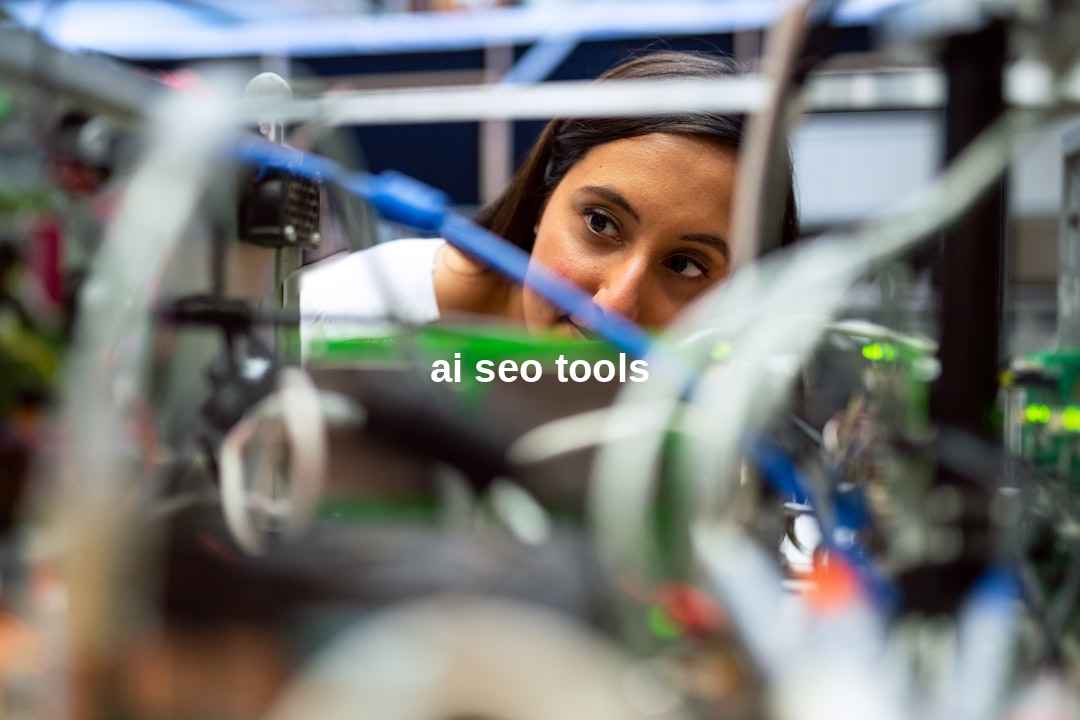Introduction:
The digital marketing landscape is evolving at an unprecedented pace, with AI for SEO at the forefront of this transformation. Artificial Intelligence (AI) is redefining the way search engine optimization (SEO) strategies are developed, deployed, and measured. With the help of AI, marketers and SEO professionals can now analyze vast amounts of data, predict trends, understand customer behavior, and personalize content more efficiently than ever before. This integration of AI technologies into SEO practices is not only enhancing the effectiveness of campaigns but also empowering businesses to achieve and maintain a competitive edge in the online world.
| Feature | Benefit | Use Case | Impact on SEO |
|---|---|---|---|
| Data Analysis | Improved decision-making based on insights | Identifying search patterns and trends | Enhanced keyword and content strategies |
| Automated Content Creation | Efficient generation of SEO-friendly content | Writing product descriptions or blog posts | Better content quality and engagement |
| Personalization | Targeted content for specific user segments | Customizing user experience on websites | Increased user satisfaction and retention |
| SEO Auditing | Identifying and fixing SEO issues promptly | Analyzing on-page SEO elements | Improved website performance in search rankings |
Embracing Innovation: How AI Enhances SEO Strategies
Revolutionizing Keyword Research and Analysis
The adoption of AI for SEO has revolutionized how marketers approach keyword research and analysis. In the past, SEO specialists had to manually sift through data and make educated guesses about which keywords might be effective for their campaigns. With AI, however, these processes have become more scientific than ever.
AI algorithms can quickly analyze search engine data, including click-through rates, search volumes, and the relevance of the keywords. They can also examine content from competing websites to determine which keywords are driving traffic to those sites. Furthermore, AI tools can predict the rise of new search terms or phrases before they become popular, enabling businesses to stay ahead of the curve.
Beyond just picking the right words, AI-powered tools assist in understanding the searcher’s intent, categorizing keywords by their buying stage, and even identifying geographical trends to optimize for local SEO. By leveraging AI to dissect and understand the nuances of keyword data, SEO professionals can craft strategies that resonate more deeply with their target audience, leading to better engagement and conversion rates.
Through AI’s advanced analysis capabilities, SEO teams no longer waste time and resources on ineffective keywords. Instead, they can strategize with precision, ensuring that every SEO action aligns with measurable performance indicators and contributes to the overall success of the digital marketing efforts.
Analyzing the Benefits: What AI Brings to the SEO Table

Enhanced Precision and Efficiency in SEO Tasks
Artificial Intelligence streamlines the SEO process, making it more efficient and accurate. One of the key benefits AI introduces is the automation of time-consuming tasks such as keyword research, data analysis, and SEO auditing. With AI’s capability to process large volumes of data swiftly, SEO professionals can gain insights in a fraction of the time it would take manually. AI’s predictive analytics can also forecast upcoming trends, enabling marketers to adjust strategies proactively.
AI’s ability to automate and refine SEO tasks results in higher productivity, more targeted strategies, and ultimately, a stronger ROI for digital marketing campaigns.
Improved Content Strategy with AI Insights
AI tools are instrumental in shaping content strategies that resonate with target audiences. By leveraging natural language processing and machine learning, AI analyzes user queries to understand intent, helping to create content that addresses users’ needs more effectively. Moreover, AI can identify content gaps on websites, suggesting topics that have the potential to drive traffic and improve SERP rankings.
With AI, content is not just created; it’s crafted to meet the specific demands of users, informed by deep learning and contextual understanding provided by advanced AI algorithms.
AI-Driven Content Creation: A New Era for Digital Marketers
Scaling Content Production with AI Assistance
AI for SEO is revolutionizing the way content is produced. AI-driven tools like content generators can create initial drafts of articles, blog posts, and product descriptions, reducing the time and effort required from human writers. Although these AI tools require human oversight to ensure quality and relevance, they help scale content creation, providing a substantial competitive edge.
The integration of AI in content creation democratizes access to high-volume, quality content production, making it easier than ever for brands to maintain a consistent online presence.
Personalization at Scale
AI’s data processing power allows for personalization at a level that is unattainable by human hands alone. By analyzing user behavior, AI can tailor content to individual preferences, thus increasing engagement and customer satisfaction. Personalized content is key in delivering relevant experiences that not only attract but also retain audiences.
AI harnesses the power of big data to deliver personalized content to users, paving the way for more meaningful interactions and forging stronger connections between brands and their audiences.
The Challenges of Integrating AI in SEO
Keeping the Human Touch in an AI-Driven World
Despite the numerous advantages of AI, one of the main challenges lies in balancing automation with the irreplaceable human touch. AI can process data and generate content, but it lacks the nuanced understanding and emotional intelligence that human content creators bring. Ensuring that content resonates on a human level requires a blend of AI efficiency and human empathy and creativity.
As much as AI for SEO can enhance productivity and insights, the challenge remains to maintain the unique human perspective that connects with audiences on an emotional and intellectual level.
Adapting to Rapid Technological Changes
Another pivotal challenge is the rapid pace of technological advancement in AI. SEO professionals need to continuously learn and adapt to these changes to utilize AI effectively. Furthermore, ethical considerations in AI usage, including data privacy and the potential for AI-generated content to spread misinformation, require vigilant management.
Staying abreast of AI developments and navigating the associated ethical landscape is as crucial as harnessing AI’s capabilities for SEO—to ensure responsible and sustainable use of technology.
Future-Proofing SEO: Symbiosis of AI and Human Expertise – A Conclusion
As we delve into the complexities and potential of utilizing AI for SEO, it becomes evident that the future of search engine optimization lies in a harmonious blend of artificial intelligence and human expertise. Integrating AI into SEO requires a thoughtful approach that respects the strengths and limitations of both machine learning and human creativity. AI can process and analyze data at an incredible scale, predict trends, and personalize content, but it is the human touch—understanding the emotional and psychological facets of consumer behavior—that makes the content truly engaging.
As the digital landscape evolves, so must SEO strategies. Adapting to AI’s capabilities and understanding its application in SEO will become increasingly important. Nevertheless, the core of SEO remains in understanding the user’s intent and providing the best answer or solution to their queries. AI enhances this process, but it is the human SEO specialist who guides it to ensure that the end goal—the user’s satisfaction—is always met.
In conclusion, the future of SEO is not about choosing between AI and human insight, but rather about leveraging the best of both. By doing so, businesses and SEO professionals can create more effective, efficient, and compelling SEO strategies that stand the test of time.
- AI significantly automates and refines keyword research, data analysis, and content creation processes, saving time and improving efficiency.
- Artificial Intelligence aids in predicting search trends and user behavior, allowing for proactive adjustment of SEO strategies.
- AI-powered tools help create personalized and relevant content, enhancing user engagement and satisfaction.
- Though AI brings many benefits to SEO, maintaining a balance between automated processes and the human element is crucial for creating content that truly connects with people.
- Continuous learning and adapting to new AI technology are essential for SEO professionals to stay competitive in a rapidly evolving digital world.
- The synergy of AI and human expertise in SEO strategies is instrumental for businesses looking to achieve long-term success online.
Frequently Asked Questions About AI for SEO
What is AI for SEO, and how does it work?
AI for SEO refers to the application of artificial intelligence technologies to enhance search engine optimization efforts. It works by using machine learning algorithms to analyze large sets of data, recognize patterns, predict trends, and automate mundane tasks. AI can help with various aspects of SEO, from keyword research and content creation to on-site optimization and performance tracking, providing more accurate and refined strategies.
Can AI fully replace human SEO experts?
No, AI cannot fully replace human SEO experts. While AI can handle data-heavy tasks and provide valuable insights quickly, it lacks the human understanding of nuanced language, emotional intelligence, and creative content creation. Human SEO experts are essential for strategy development, interpreting AI data correctly, and infusing empathy and creativity into content that AI alone cannot achieve.
How does AI enhance keyword research?
AI enhances keyword research by rapidly analyzing search data, identifying patterns, understanding user intent, and predicting emerging trends. It facilitates the identification of relevant keywords and helps understand how different keywords perform over time, allowing SEO professionals to make data-driven decisions and craft strategies tailored to real user behavior.
What are the ethical considerations when using AI in SEO?
The ethical considerations when using AI in SEO include concerns about data privacy, the accuracy and bias of AI algorithms, and the potential misuse of AI-generated content. Ethical use of AI involves being transparent about how data is collected and used, ensuring AI systems are unbiased and fair, and monitoring the content to prevent the spread of misinformation.
Will AI make SEO more or less important in the future?
AI will make SEO more important in the future, as it opens up new opportunities and capabilities for optimization. The digital marketing landscape is becoming increasingly competitive and complex. With AI, SEO strategies can become more targeted and effective, ensuring that businesses stand out and reach the right audiences in the sea of online content.
How can businesses integrate AI into their current SEO strategies?
Businesses can integrate AI into their current SEO strategies by adopting AI-powered tools for data analysis, content generation, automation of tasks, and personalized user experiences. It’s important to start with a clear goal in mind, choose the right tools that complement human expertise, and continually monitor and refine processes to gain maximum benefits from AI’s capabilities.
Does using AI for SEO improve website rankings?
Using AI for SEO can improve website rankings by enabling more accurate and efficient optimization practices. AI can help create high-quality, relevant content, improve on-page optimizations, and identify backlink opportunities, all of which are key factors that search engines consider when ranking websites. However, improved rankings also depend on the overall quality of an SEO strategy and its execution.


